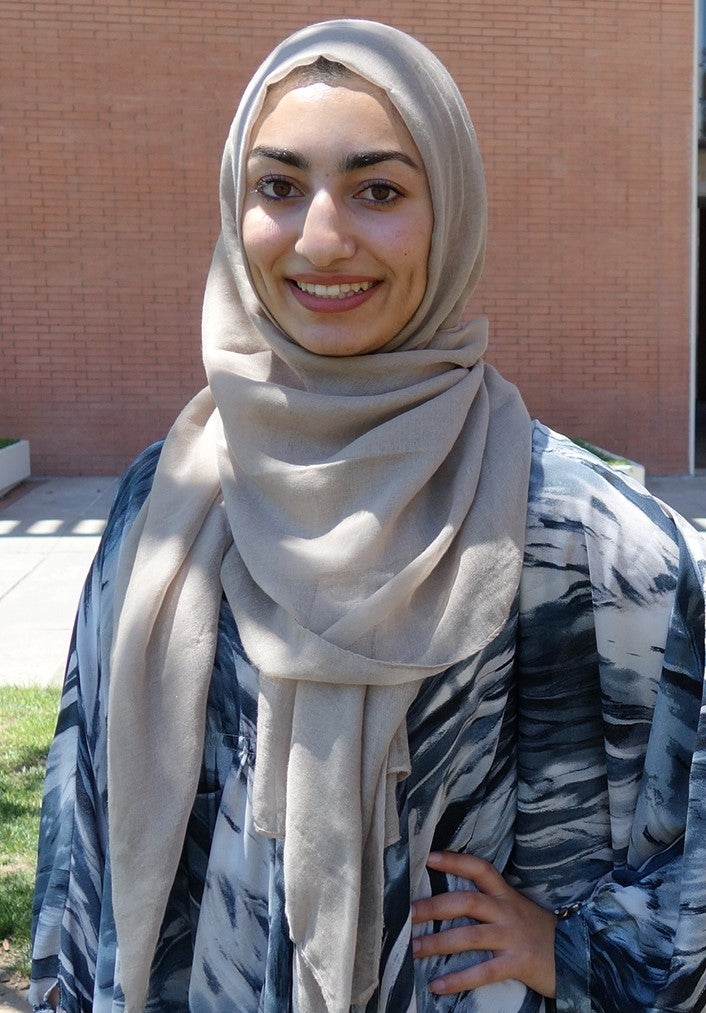Center for Advanced Genocide Research Awards 2017 USC Undergraduate Student Research Fellowship to Noha Ayoub
In one testimony in the Visual History Archive, a Rwandan Tutsi Genocide survivor recounts a disturbing story from his childhood: At his school, he and the other Tutsi students were put on lockdown in their dorms while the school administrators met with the Hutu students to tell them that their Tutsi classmates were plotting to kill them.
It’s a story that caught the eye of USC Shoah Foundation DEFY Undergraduate Research Fellow Noha Ayoub as she conducted research in the Visual History Archive this month. Ayoub is studying nationalism in Rwanda and the ways in which fictionalized narratives against Tutsis perpetrated by the state led to genocide over 20 years ago.
Ayoub is a junior at USC majoring in Law, History and Culture and minoring in Middle East Studies. She first became interested in the topic of nationalism and its potential for violence during her freshman year while taking a class on Middle East sovereignty, and started examining modern-day issues, like Turkey’s marginalization of the Kurds, and past events such as the Armenian Genocide.
Last year’s DEFY fellow, Nisha Kale, encouraged Ayoub to focus on the Rwandan Tutsi Genocide and helped her craft a proposal for the DEFY fellowship, which is awarded to two undergraduate USC students each summer to conduct research in the Visual History Archive under the guidance of Institute staff.
During her month-long fellowship, Ayoub has watched dozens of testimonies and supplemented her viewing with texts about nationalism in order to contextualize the stories the survivors tell in their testimonies.
“The question is, how do you compel a people to kill their friends, neighbors, their family often times?” Ayoub said. “It’s about understanding the greater politics at play and seeing how the genocide wasn’t what we usually consider as a traditional ethnic conflict, it was an organized killing and we need to understand it as such.”
She has watched many testimonies of survivors who were children or teens during the genocide, who talk about first learning the differences between “Tutsis” and “Hutus” at school. School provided a fertile breeding ground for the kinds of fictionalized narratives about Tutsis that the government and other official institutions propagated in order to encourage Hutus to cast Tutsi people out of society and, ultimately, to kill them.
Watching testimonies of survivors in the Visual History Archive helps Ayoub get to know the real people who were affected by anti-Tutsi rhetoric. The archive is a “collective memory,” she said, where survivors can corroborate their stories and offer anecdotal evidence that these crimes occurred.
“Testimony for me is a way of understanding that when we talk about theory, when we talk about history, we are talking about people who’ve experienced some of the worst cases of violence in human history,” Ayoub said. “Until you can look at that violence in the face it’s not helpful for us to try to talk about it, until we try to engage with it as people.”
Understanding the effect of politics and rhetoric on humanity is Ayoub’s main goal. From her research, she hopes to gain insight into how everything is connected, from the words we use to the leaders we elect. What we believe informs our actions, as individuals and as a society, and so we must scrutinize what we say, why we say it, and how this affects marginalized communities in particular.
“If we’re not constantly being introspective then we don’t get anywhere,” she said. “If we’re not constantly reevaluating ourselves we have no hope for progress.”
